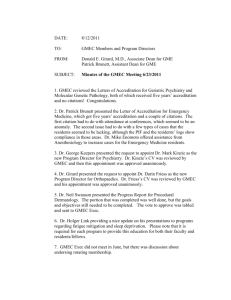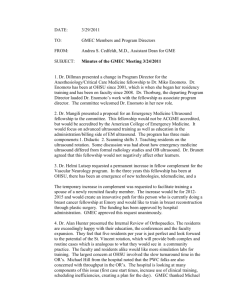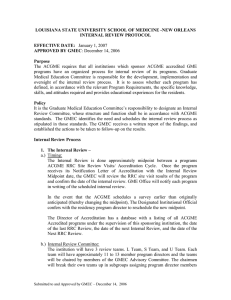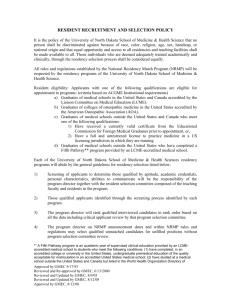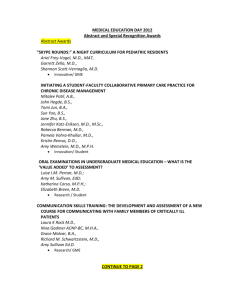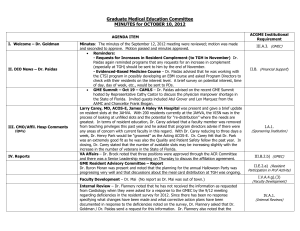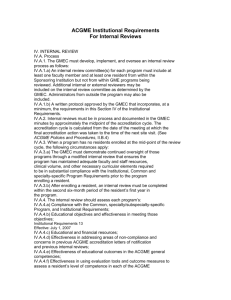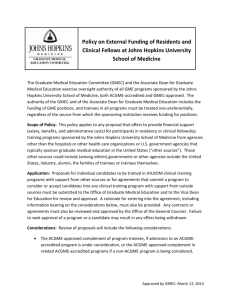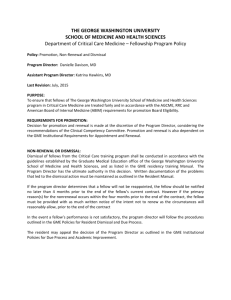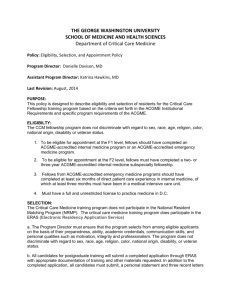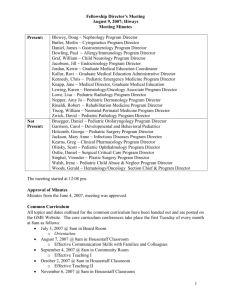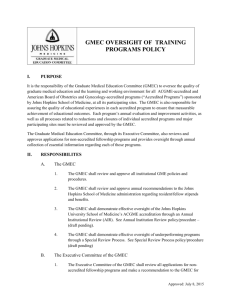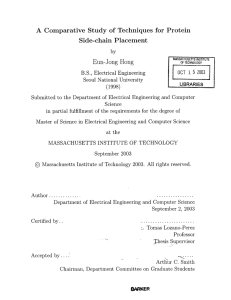DATE: 2/25/2011 TO: GMEC Members and Program Directors
advertisement
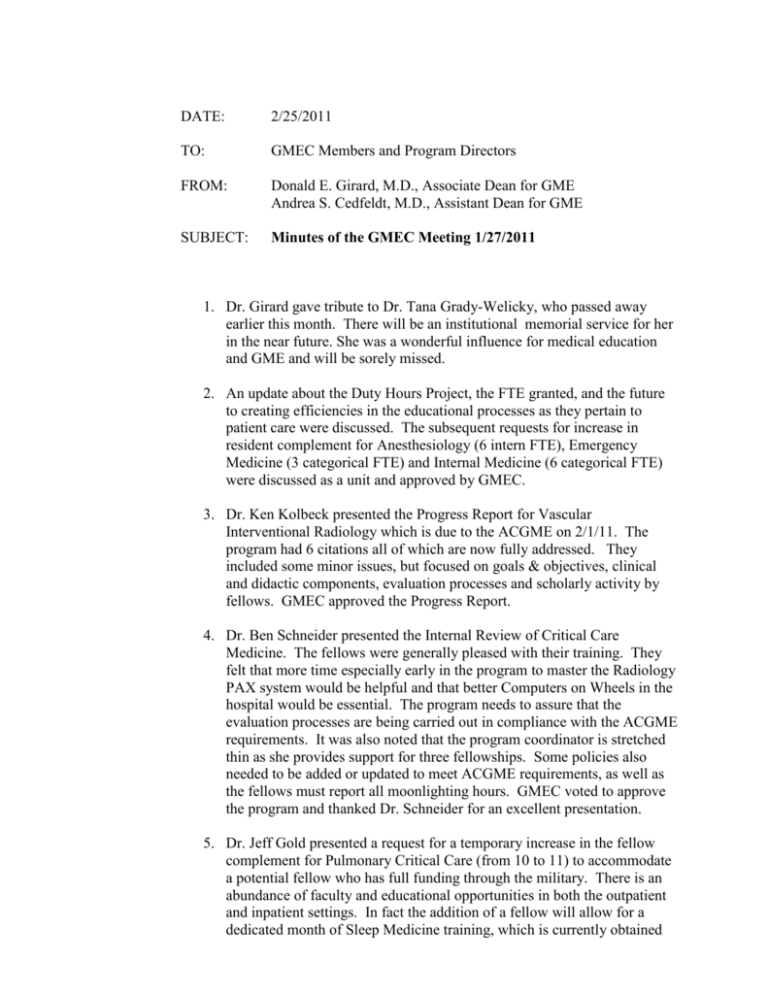
DATE: 2/25/2011 TO: GMEC Members and Program Directors FROM: Donald E. Girard, M.D., Associate Dean for GME Andrea S. Cedfeldt, M.D., Assistant Dean for GME SUBJECT: Minutes of the GMEC Meeting 1/27/2011 1. Dr. Girard gave tribute to Dr. Tana Grady-Welicky, who passed away earlier this month. There will be an institutional memorial service for her in the near future. She was a wonderful influence for medical education and GME and will be sorely missed. 2. An update about the Duty Hours Project, the FTE granted, and the future to creating efficiencies in the educational processes as they pertain to patient care were discussed. The subsequent requests for increase in resident complement for Anesthesiology (6 intern FTE), Emergency Medicine (3 categorical FTE) and Internal Medicine (6 categorical FTE) were discussed as a unit and approved by GMEC. 3. Dr. Ken Kolbeck presented the Progress Report for Vascular Interventional Radiology which is due to the ACGME on 2/1/11. The program had 6 citations all of which are now fully addressed. They included some minor issues, but focused on goals & objectives, clinical and didactic components, evaluation processes and scholarly activity by fellows. GMEC approved the Progress Report. 4. Dr. Ben Schneider presented the Internal Review of Critical Care Medicine. The fellows were generally pleased with their training. They felt that more time especially early in the program to master the Radiology PAX system would be helpful and that better Computers on Wheels in the hospital would be essential. The program needs to assure that the evaluation processes are being carried out in compliance with the ACGME requirements. It was also noted that the program coordinator is stretched thin as she provides support for three fellowships. Some policies also needed to be added or updated to meet ACGME requirements, as well as the fellows must report all moonlighting hours. GMEC voted to approve the program and thanked Dr. Schneider for an excellent presentation. 5. Dr. Jeff Gold presented a request for a temporary increase in the fellow complement for Pulmonary Critical Care (from 10 to 11) to accommodate a potential fellow who has full funding through the military. There is an abundance of faculty and educational opportunities in both the outpatient and inpatient settings. In fact the addition of a fellow will allow for a dedicated month of Sleep Medicine training, which is currently obtained in a more casual manner. This will benefit the fellows as they sit for the board, in that 15% of the exam is about Sleep Medicine. GMEC voted to approve this request. 6. GMEC Exec reviewed a request for a new site Sequoia, for Forensic Psychiatry and a Progress Report from the Letter of Accreditation for Psychiatry, both of which were approved. The Letter of Accreditation for Pediatric Anesthesiology provided a citation due to the lack of a specific letter of support by the sponsoring institution for their program. It was decided that the current letter of support for all training programs would be revised and signed off on. The main discussion focused on struggling learners: how to determine when they need low level remediation versus more intervention. Dr. Pat Brunett outlined a Consensus Review process their program just started to identify early on learners who are struggling. It uses a quick assessment of three major areas for each resident by all faculty in a confidential manner, which identifies early on a learner who may not be performing well. The program then does an Individual Learning Plan for those residents. 7. The Annual List of residents/fellows completing, matriculating to the next level and entering programs has been sent to each program director and coordinator. They are due back with revisions by 2/4/2011. Jason Roan, GME’s Finance Manage appreciates the quick submission of these important documents. 8. Dr. Girard said that the process of submitting the Annual List was one of many ways to notify GME of struggling learners. While not all issues rise to the level of reporting to GME if they are routine remediation, many issues do require the involvement of the Associate Dean for GME. It was noted that many program directors with the best of intentions in trying to help their trainees end up in difficult situations, due to the lack of experience or being unaware of the legal pitfalls or resources. GME is here to help and early is better. 9. Dr. Rob Hendrickson, Medical Director for Emergency Management, talked about the Emergency Medicine Committee and developing a liaison with the House Officers Association to ensure better training of residents/fellows about what to do in care of an emergency and how a major disaster should be handled. Drs. Jeff Gold, Tan Ngo and Hendrickson will meet going forward to establish GME/House officers serving on this committee. 10. Eric Switzer presented a correllary issue to this, regarding the notification of residents when there is a emergent issue, such as recently occurred at both OHSU (bomb threat) and the VA (someone with a gun). While an email blast takes about 15 seconds to create and send, it is not going to reach everyone in a timely manner. Text pages to those with pagers is a good solution. However, those with smart phones may not be able to receive text pages currently due to proprietary issues. The phone companies do not want to be liable for missed calls in these cases. However, they are negotiating with OHSU and for an annual fee, may agree to allow these text pages. The OHSU and VA public safety departments are in communication during situations similar to those indicated, and rely on each site to communicate with their employees. It was hoped that OHSU would also identify other hospitals to share information with as well, since our residents rotate all over the city. Respectfully submitted and emailed to all Program Directors, Program Coordinators and GMEC Members. Donald E. Girard, M.D. Chair, GMEC Attachment: Attendance Record
